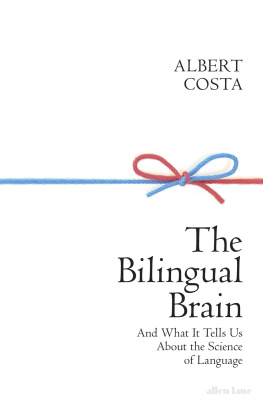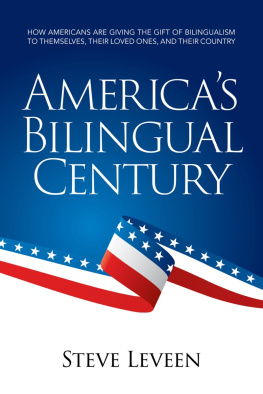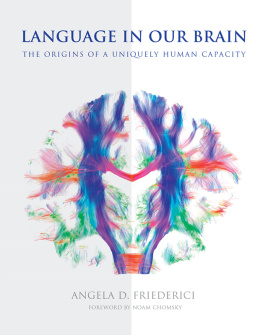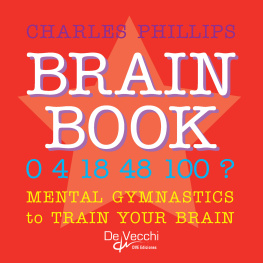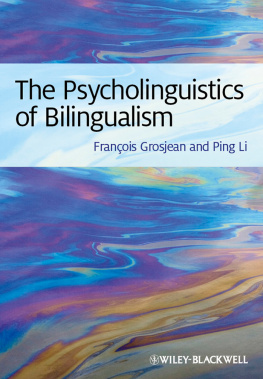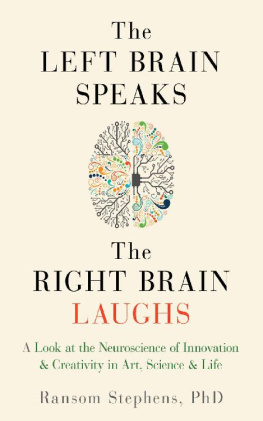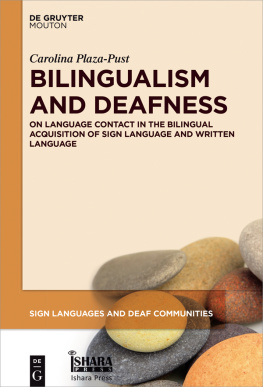Albert Costa
THE BILINGUAL BRAIN
And What it Tells Us about the Science of Language

PENGUIN BOOKS
UK | USA | Canada | Ireland | Australia
India | New Zealand | South Africa
Penguin Books is part of the Penguin Random House group of companies whose addresses can be found at global.penguinrandomhouse.com.

First published in Spanish under the title El Cerebro Bilinge by Debate 2017
This translation published by Allen Lane 2019
Copyright the Estate of Albert Costa, 2017
Translation copyright John W. Schwieter, 2019
The moral right of the author and of the translator has been asserted
Cover photographs Getty Images
ISBN: 978-0-241-39152-5
This ebook is copyright material and must not be copied, reproduced, transferred, distributed, leased, licensed or publicly performed or used in any way except as specifically permitted in writing by the publishers, as allowed under the terms and conditions under which it was purchased or as strictly permitted by applicable copyright law. Any unauthorized distribution or use of this text may be a direct infringement of the authors and publishers rights and those responsible may be liable in law accordingly.
This book is dedicated to my two favourite bilinguals: Chiqui, who makes the tuna croquettes, and Alex, who eats them.

Prologue
We are all talking heads. Even though we may not think about it, this is perhaps why everyone is consciously or unconsciously interested in language. From parents who watch their children with amazement as they say their first words, to people who suffer from speech problems as a result of brain damage, we have all wondered how the human brain acquires and processes languages. This book is dedicated to the age-old questions: how do two languages coexist in the same brain? And what are the implications of this coexistence? Is there anything special about being bilingual?
Why dedicate an entire book to the phenomenon of bilingualism? Well, because by and large, bilingualism is the rule rather than the exception in the sense that the majority of the worlds population can communicate in more than one language. If we want to understand how language functions in the human brain, it would be a mistake to ignore this phenomenon. Studying the bilingual brain allows us to explore additional questions about how language interacts with other cognitive domains, such as attention, learning, emotion, and decision-making. Bilingualism is a window into the study of human cognition.
As you read this book, you might find more questions than answers about some of the issues raised. That is partly my aim: to pique your interest about how two languages coexist in the same brain and about how these issues are studied. During our journey, results from scientific research are presented to shed light on questions such as: how do babies exposed to two languages differentiate between them? What are the different language-learning trajectories for bilingual and monolingual babies? What are the neural bases that underpin the two languages of a bilingual speaker? How does bilingualism affect the development of other cognitive abilities? How do the two languages deteriorate due to brain damage? How does the use of a second language affect decision-making? If these questions seem a bit abstract, lets look at how it all works in practice.
Alex is a child born in a bilingual family in Boston where the mother speaks English and the father speaks Spanish. The parents each decide to speak to the child in their respective language, while wondering if this would have a negative effect on the babys language development. They suspect that the cognitive processes that Alex would acquire for two linguistic systems would be different from those he would develop if they only spoke to him in one language (i.e., if the child were to grow up in a monolingual household). The parents know that their situation is not uncommon given that many babies are exposed to two languages, either because their family speaks two at home or because they have immigrated to a place where another language is spoken. Alex will have to learn to distinguish between the two languages in order to identify the sounds and words that correspond to each. In other words, he will have to develop two differentiated phonological and lexical systems. How is this achieved? Will this exposure result in a confused and deficient linguistic system? Well, it turns out that, despite what common sense or popular belief might dictate, we are beginning to have access to rigorous scientific evidence that explains the learning processes Alex will go through to acquire two languages simultaneously and without apparent difficulties. In this book, we will look at some studies that explore these issues as early as the first month of life. Yes, you read that right: babies who are only a month old. The ingenuity of researchers who are dedicated to studying human development is phenomenal. By the way, Alex is now fourteen years old and can get by perfectly in three languages: English, Spanish, and Catalan, and I should know because he is a chatterbox: Alex is my son.
Lets consider another case, that of Laura who was diagnosed with Alzheimers three years ago and is still at an early stage of the disease. She lives alone in Barcelona, where she gets along quite well. Laura has always spoken to her daughter, Maria, in Spanish, as it is her first language, although she knows and has used Catalan regularly for the last eighty years. Maria begins to notice that her mother has some difficulties communicating and, while at the time it doesnt seem all that important, they begin to wonder about things like: when the disease progresses and more severely affects Lauras cognitive capabilities, what language will she end up speaking? Will the disease affect both languages equally? Will Laura be able to differentiate between the two languages and communicate in the one she wishes to without interference from the other? Studying these issues not only allows us, or better yet, will allow us to best help Laura (and her family), but it also informs us about how two languages are represented in a single brain. Knowing this will help us to make decisions about which language(s) to use in treatment and rehabilitation.
The cases of Alex and Laura are just two of the many examples that you will find throughout this book. Although I have taken the liberty of using pseudonyms to protect their identity, they are real cases that will help you to understand the issues that arise when we study how two languages are learned and used.
At this point you may be wondering what I mean by the term bilingualism. Although I prefer to avoid giving prescriptive definitions, I think it is fair to address this particular term. I promise that I will do it here and will not bring it up again.
Defining bilingualism is like trying to hit a moving target. By this I mean that traditional definitions are either so broad that they are not useful, or so narrow that they leave out many cases of people who use two languages. This is because the experience of being in contact with a second language is rather varied. For example, if we define bilinguals as only those people who have a very similar mastery of two languages, we ignore a large number of individuals who, although they perform much better in one language, use both frequently and without too much difficulty. On the other hand, if we take the age at which the two languages were learned as a defining characteristic of bilingualism, and consider bilinguals as individuals who have been exposed to two languages since the cradle, we will leave out another large set of people who use two languages regularly. To complicate the situation further, we often encounter great disparity in the abilities of the same person with respect to language use. For example, there are individuals who have advanced fluency and rich vocabulary in their second language but a very strong foreign accent. One such case is that of the well-known novelist Joseph Conrad, who wrote his most important works in English even though he was of Polish origin and learned English relatively late. Despite his extraordinary writing in English, Conrad had a strong Polish accent. You will probably agree with me that not considering him a bilingual would be absurd. By the way, Conrad is not an exceptional case; consider more recent cases (of perhaps less praiseworthy people) such as former US Secretary of State Henry Kissinger and former Governor of California Arnold Schwarzenegger.

